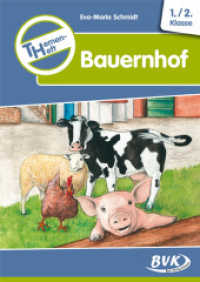- ホーム
- > 洋書
- > 英文書
- > Performing Arts
Full Description
Carousel (1945), with music by Richard Rodgers and the book and lyrics by Oscar Hammerstein II, was their second collaboration following the surprising success of Oklahoma! (1943). They worked again with Theresa Helburn and Lawrence Langner of the Theatre Guild (producers), Rouben Mamoulian (director), and Agnes de Mille (choreographer). But with Oklahoma! still running to sell-out houses, they needed to do something quite different.
Based on a play, Liliom (1909), by the Hungarian playwright Ferenc Molnár, Carousel took Broadway musical theater in far darker directions because of its subject matter-the protagonist, Billy Bigelow, is wholly an anti-hero-and also given its extensive music that some claimed came close to opera. The action is shifted from a gritty working-class suburb of Budapest to the New England coast (Maine), but the themes remain the same as two social misfits try to survive harsh economic times. Billy Bigelow is unemployed, prone to domestic violence, and dies in the course of committing a robbery; Julie Jordan sticks by him through thick and thin; and the show seeks some manner of redemption for both of them as Billy is given a day back on earth to do some good for his wife and their daughter. Troubling though these matters are nowadays, they fit squarely in the context of a country moving through the end of World War II to an uncertain future.
Not for nothing had composers such as Giacomo Puccini and Kurt Weill already tried to persuade Molnár to release his play. It also led Rodgers and Hammerstein to new heights: songs such as "If I Loved You," Billy's "Soliloquy," and "You'll Never Walk Alone" transformed the American musical. In this book, we discover how and why they came about, and exactly what Carousel was trying to achieve.
Contents
Contents
Acknowledgments
Sources and permissions
List of illustrations, tables, and music examples
1: Carousel in Context
2: Molnár's Liliom: From Budapest to Broadway (and Beyond)
Three film versions
The Theatre Guild, American musical theater, and a would-be Carousel
Molnár sees Oklahoma!
3: Creating Carousel
Some dilemmas
Hammerstein's draft scenario
Casting, rehearsals, and tryouts
4: A Duet, a Soliloquy, and a Ballet
The "Bench scene"
"Soliloquy"
"Louise's Ballet"
5: The Problems of an Ending
Up or down?
A post-war message
6: From Stage to Screen (and Back)
The search for "American opera"
Carousel on film
Restoring Carousel
Appendix: Hammerstein's Scenario for Carousel
Further Reading, Listening, and Viewing
Notes
Index







